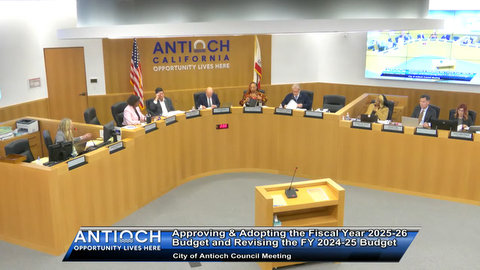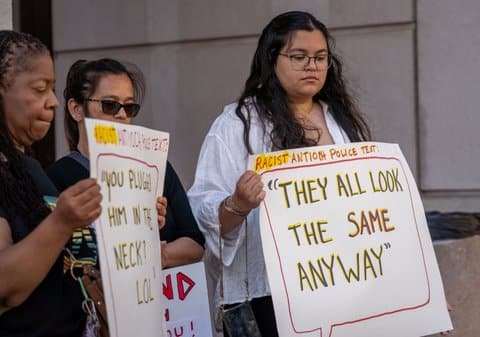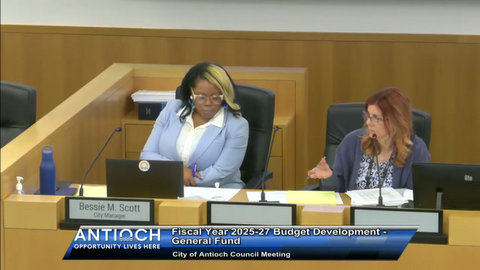
27 Jun Antioch Approves Budget, Reduces Crisis Response Services

The city of Antioch on Tuesday adopted its budget for the next fiscal year. (Screenshot captured by Samantha Kennedy / The CC Pulse)
By Samantha Kennedy
On the same day a former Antioch police officer received the longest sentence yet in the city’s police misconduct scandal, the City Council moved forward with additional police accountability as part of its agreement with the U.S. Department of Justice. But it slashed service in half for a non-police crisis response team to help reduce a more than $54 million budget deficit.
The Antioch City Council on Tuesday approved what the staff report calls “a ‘balanced’ budget” for the 2025-26 fiscal year with the net deficit of $7.7 million being absorbed using General Fund reserves.
It comes weeks after the council concluded around a dozen special budget meetings that took place to reduce the deficit line by line — including the then-$24.27 million deficit for 2026. (Following the meetings, council members estimated the 2025-26 budget deficit at $7.5 million with the use of stabilization funds.)
Crisis response to reduce service
The Angelo Quinto Crisis Response Team, which is named for a Navy veteran who died days after an Antioch officer kneeled on him during a mental health crisis, was among the casualties in the budget process.
Talks to reduce the service came during the special budget meetings. Though the program is run using one-time funding, extra money was required to maintain the current level of service. The reduction in services was a separate agenda item on the consent calendar but was pulled for discussion before being passed.
“On an ongoing basis, we need to figure out how to fund it better and — we’ve been hearing a lot about leadership in Antioch tonight — the best response … is to come out not only better, but as a leader in this area,” Robert Collins, Quinto’s stepfather, told the council.
The AQCRT responds to low-level, non-violent 911 calls, often in place of APD. Since being founded, the program has relied on money from the American Rescue Plan Act, which left the future funding source unclear.
Instead of offering services 24/7, the new agreement with the nonprofit that runs it, the Felton Institute, reduces service to 12 hours per day, seven days a week. Services will happen during “peak demand periods,” according to Monserrat Cabral, the city’s youth services network manager.
The number of community resource specialists, who staff the team, will also be reduced from 11 to six.
Council member Tamisha Torres-Walker warned of the risks in reducing successful programs.
“As a city, I’m hoping that we can commit to finding dollars to bring the service back to standard because what I also know is true is … cities scale back programs, hell breaks loose, and then we blame the program for not working,” said Torres-Walker.
The AQCRT responded to more than 2,400 dispatch calls between January and June this year, according to a presentation to the Antioch Police Oversight Commission this month. Most of the calls were welfare checks.
According to the city, ARPA funds will be able to sustain the reduced service model through August 2026 or until those funds run out.
U.S. Department of Justice consultant
Progress on the U.S. Department of Justice agreement also continued at Tuesday’s meeting as council members unanimously approved a new consultant that the city says will ensure the handling of police misconduct allegations is “unquestionably impartial.”
Council members approved a $150,000 contract with Chaplin and Hill Investigative Services on the consent calendar to meet a requirement in the DOJ agreement that calls for internal investigative services.
The council’s decision came hours after former Antioch K-9 officer Morteza Amiri was sentenced to seven years for civil rights violations, falsifying records and wire fraud. Amiri was one of 10 Antioch and Pittsburg officers who were charged in a scandal that included racist texts, civil rights violations, a college degree scam and a conspiracy related to steroid sales.
The conduct prompted a federal investigation into both departments that reduced APD’s staffing because of the alleged widespread involvement of officers. The city and the U.S. DOJ came to the agreement in January, which called for changes to police policies and increased oversight and transparency.
The charges against Amiri and other officers, including Devon Wenger, who earlier this year stood trial with Amiri before a mistrial was declared for one of his cases, were proof to community members of the widespread racism and other discrimination within the department, but left a lasting impact on the community.
From questioning the motives of then-interim Police Chief William “Brian” Addington upon his arrival and other current officers (some of which are supporters of Amiri, the Bay Area News Group notes) to wariness with the new administration — made up of Mayor Ron Bernal and council members Don Freitas and Louie Rocha — that has led to the resignation of a police oversight commission and clashes between officials and residents.
And, in addition to the U.S. Department of Justice oversight, the state DOJ will likely enter into an agreement with the city sometime in the future, the city said at the last meeting. The potential financial impact of that agreement is still unknown.
Officials have pledged to keep a close eye on the budget no matter what lies ahead. That means monthly budget updates and an ongoing effort, led by City Manager Bessie Scott and director of finance Dawn Merchant, to further reduce the deficit.
The number officials are up against? At least $15.6 million for 2027.
“We thought this was hard, this was low-hanging fruit,” said Bernal. “It’s only going to get harder as we move forward.”






No Comments